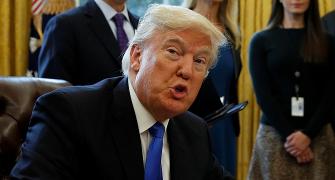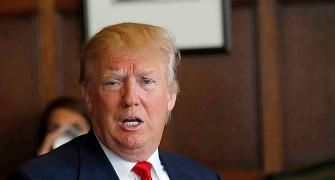In a major blow to President Donald Trump, a United States federal appeals court on Sunday rejected a request by his administration to immediately reinstate travel ban on citizens of seven Muslim-majority countries.

The Justice Department had made the request with the 9th Circuit Court of Appeals in San Francisco as part of an appeal against a lower court order halting the travel ban on people from Iraq, Iran, Syria, Sudan, Somalia, Libya and Yemen.
The court asked challengers of the ban respond to the appeal, and for the Justice Department to file a counter-response by Monday.
Citing the president's "sovereign prerogative" to admit or exclude aliens, lawyers for the Department of Justice earlier told the court that the states of Washington and Minnesota should not have been allowed to challenge the ban, and that a judge was wrong to stop Trump's executive order.
Acting Solicitor General Noel Francisco said the president alone has the power to decide who can enter or stay in the US.
"Judicial second-guessing of the President's determination that a temporary suspension of entry of certain classes of aliens was necessary at this time to protect national security would constitute an impermissible intrusion on the political branches’ plenary constitutional authority over foreign affairs, national security, and immigration," Francisco said.
The administration was fighting Seattle federal judge James Robart's decision on Friday that imposed a temporary, nationwide halt to Trump's order barring refugees and those from seven majority-Muslim nations from entering the country.
Soon after Robart's ruling, Trump attacked the judge, a George W Bush appointee, on Twitter, calling him a "so-called judge" and saying his opinion was "ridiculous and will be overturned".
Trump's executive order banned travel to the US from seven Muslim-majority countries for 90 days, suspended all refugee entry to the US for 120 days and indefinitely suspended entry for Syrian refugees.
After Friday's ruling, the Department of Homeland Security announced it had suspended all actions to implement the immigration order and would resume standard inspections of travellers as it did prior to the signing of the travel ban. At the same time, it urged the Justice Department to challenge the ruling "at the earliest possible time".
Trump had exuded confidence that his administration would prevail in the government's appeal of the ruling.
"We'll win," Trump had told White House pool. "For the safety of the country, we'll win."
"The judge opens up our country to potential terrorists and others that do not have our best interests at heart. Bad people are very happy!" Trump had said, expressing his clear displeasure over Robart's ruling.
"What is our country coming to when a judge can halt a Homeland Security travel ban and anyone, even with bad intentions, can come into US ?" he had asked in another tweet.
"Because the ban was lifted by a judge, many very bad and dangerous people may be pouring into our country. A terrible decision," he had tweeted to his 23.7 million followers.
Experts said that the US had been brought to the brink of a full-blown constitutional crisis.
"This is an epic confrontation between the presidency and the constitution," said Marci Hamilton, a constitutional lawyer and scholar of religion at the University of Pennsylvania.
"The moment Trump suggests anyone disobey the federal court order then we will be in a constitutional crisis."
Patrick Leahy, the ranking Democrat on the Senate judiciary committee, said in a statement that Trump seemed intent on precipitating a constitutional crisis.
"The president's hostility toward the rule of law is not just embarrassing, it's dangerous," Leahy said, calling the travel ban an "arbitrary and shameful" attempt to discriminate against Muslims.
The State Department said that those with valid visas could enter the country.
Advocates encouraged travellers from the affected countries who qualified for entry to get on planes as soon as possible because of the unpredictable legal terrain.
More than a dozen legal challenges have been filed around the country, and only one judge so far has indicated that he was willing to let Trump's order stand.
It is somewhat unusual for a district judge to issue an order that affects the entire country, but Robart said it was necessary to follow Congress’s intention that "the immigration laws of the US should be enforced vigorously and uniformly."
He was quoting from a 2015 appeals court ruling that had blocked former president Barack Obama's executive action that would have made it easier for undocumented immigrants in this country to remain. It was never implemented because of legal challenges.
While the losing side can then request intervention from the Supreme Court, it would take the vote s of five justices to overturn the panel decision, Washington Post said.
Meanwhile, thousands of people from London and Paris to New York and Washington staged fresh protests against Trump, who took office on January 20.









